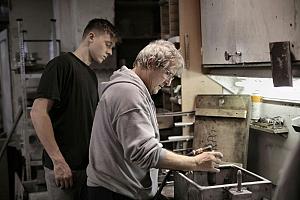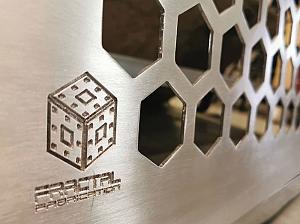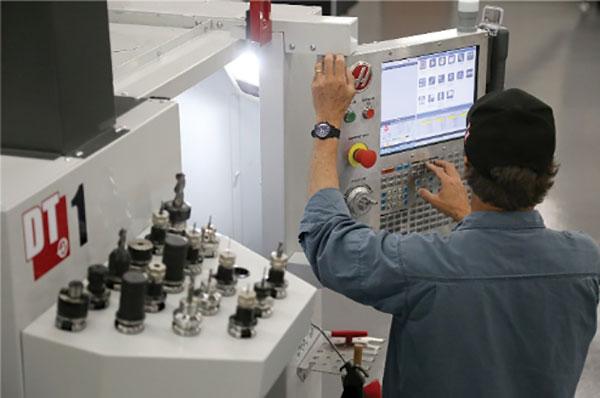President
- FMA
- The Fabricator
- FABTECH
- Canadian Metalworking
Saving skilled-trades jobs starts now
Filling the skills gap in Canada’s manufacturing industry is paramount for the future
- By Paul Krainer
- June 11, 2020
Manufacturing is one of the country’s most important economic sectors and it has huge potential for Canada’s future economic growth and prosperity.
The manufacturing industry accounts for $174 billion of Canada’s GDP and 68 per cent of its merchandise exports. All of this adds up to 1.7 million well-paying jobs.
Technology has changed the way products are being manufactured. To grow and compete, the metal manufacturing industry has modernized itself by installing CNC machine tools and automation.
Just as important, to provide a high level of innovation, manufacturers rely on a highly skilled and knowledgeable workforce that includes engineers, manufacturing technologists, and machinists. Yet manufacturers rank skilled-labour shortages as the most important issue they face today.
The effect of this results in several disadvantages: Employers are delaying investing in advanced manufacturing technologies, manufacturers are declining potentially lucrative production opportunities, and companies are limited in their ability to use their newly purchased investments.
The deficit of a skilled-labour pool is directly affecting the growth of manufacturing in Canada today.
First-hand Knowledge
As a Western Canadian machine tool distributor that also employs machinists and millwrights, Thomas Skinner & Son Ltd. has witnessed the skills shortage that manufacturers face first-hand. Working with machine shops and OEMs, we see that the industry needs to proactively consult with university engineering departments and academics, government policymakers, and educational providers from middle schools up to the polytechnic institutes to make a difference.
Today’s youth must be attracted, informed, and enabled to partake in this great industry.
Collectively we must change the culture defined as “blue-collar jobs.” No longer are assembly-line tasks or a dirty work environment an accurate image of manufacturing or skilled-trades work. The perception that a career in the manufacturing trades is a less worthy profession is outdated and shortsighted.
Therefore, we need all the aforementioned groups to adopt a stewardship of this burgeoning demographic. By fostering an attitude of enthusiasm and excitement, we can inspire young minds to have a creative, rewarding, and challenging career in this industry.
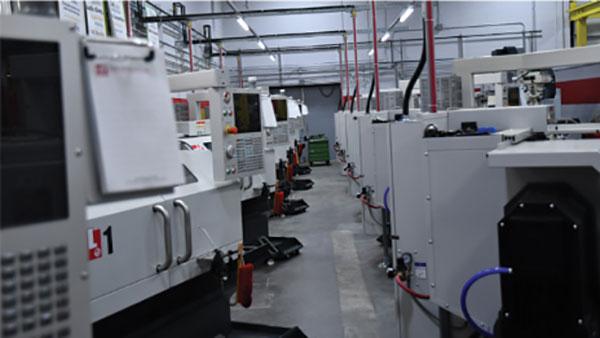
Access to CNC machinery is paramount to developing machining skills. Photo courtesy of Saskatchewan Polytechnic.
Showing the benefits of a career in manufacturing and the skilled trades has to start at the middle and secondary school levels. Today’s CNC machines are computer-driven. Youth grow up with a computer in their hand. It is natural for them to be interested in CNC machining, automation, and CAD/CAM.
You can create nearly anything on a CNC machine. How cool is that? Many skilled workers also enjoy high wages and good job availability in many regions.
Post-secondary Learning
Canada has the infrastructure to train our future workers. Canada has world-renowned universities that are educating and producing engineers who are developing new products and methods to manufacture them. The quest for innovation never stops.
On the practical application of technology, Canada is fortunate to have a system of highly respected polytechnic institutions. I know because Thomas Skinner’s customers and workforce are trained by them. These institutions train various levels of machinists right up to the Red Seal level, as well as manufacturing technologists and mechanical engineers.
There are courses in robotics and mechatronics, and they also train school shop teachers. Graduates of the polytechnic institutions have an employment rate of 96 per cent.
It is very important that the polytechnic institutions keep pace with the technological changes in our industry. For example, to successfully make precision parts, manufacturers must make them on a CNC machine.
Canadian manufacturing companies are investing in the development of partnerships with polytechnic institutions to make sure that the schools are kept up-to-date with what industry needs: work-ready CNC machinists, technologists, and engineers.
Industry’s Role
Industry has a main role in helping bridge the skills gap, and a prime example is Haas Automation, the largest CNC machine tool builder in North America. The Gene Haas Foundation, created by and named for the company’s owner, has made it its primary goal to build skills in the machining industry by providing scholarships to CNC machine technology students.
Canada has benefited from this mission. The foundation’s donations have made it possible for institutions such as Southern Alberta Institute of Technology, Saskatchewan Polytechnic, Red River College, Georgian College, and Conestoga College, among others, to create modern facilities for training students of the trade.
Haas Automation itself offers educational discounts to learning institutions. With these incentives, schools can offer students access to modern industrial CNC machines and technology and relevant, high-tech, hands-on educational experiences. There has never been another philanthropic benefactor in the history of our trade like Gene Haas.
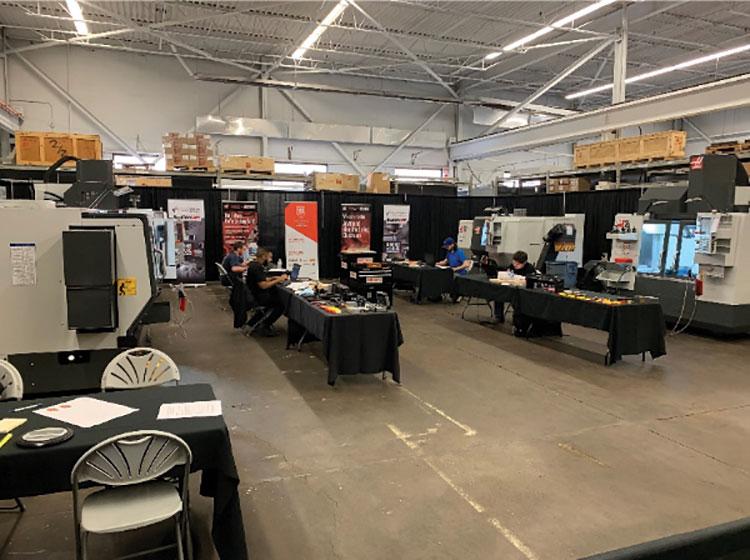
WorldSkills Team Canada 2019 Selection Event was held at the Halifax Exhibition Centre in May 2019. Photo courtesy of Sirco Machinery.
Haas Factory Outlets, Thomas Skinner in Western Canada and Sirco Machinery in Eastern Canada, also are big supporters of the Skills Canada competitions. These Olympic-style competitions are a great way to introduce and promote skilled-trades and technology careers to youth, and they are a tremendous asset to building a healthy manufacturing industry in Canada. It is heartening to see thousands of student spectators being bussed into provincial/territorial and national Skills Canada Competitions to see the skills of the various trades.
Two competency-based competitions are related to machining. They are Precision Machining on manual machine tools and CNC Machining on both CNC lathes and CNC milling machines. In the CNC Machining competition, the student competitor is given a part drawing that he or she has to program, set up the tooling on the machine, and then produce the part, all within a set time limit. To ensure the part’s accuracy, it is measured on a CMM.
The Skills Canada Competitions are held in each province and territory annually. The Skills Canada National Competition is held in a different city each year. The WorldSkills Competition is held every other year, and the best Canadian CNC machinist student must qualify by winning at the Skills Canada National Competition. I encourage everyone to attend their provincial/territorial Skills Competitions, and when the Skills Canada National Competition is held in your part of the country, don’t miss it!
Canada has a tremendous opportunity to grow its manufacturing base and create meaningful, skilled, and well-paying jobs. The last frontier is exposing our youth to the skilled trade of machining at an earlier age. To facilitate this, we must have a team co-operation. In truth, four things must happen for this work:
- Our provincial governments need to revise their educational policy to include the introduction of the skilled trade of machining into middle and secondary schools.
- Our manufacturers need to work more closely with our polytechnic institutions to support the development and fine-tuning of curriculums, ensuring their relevance to today’s technology.
- Our businesses need to invest more in the training and skills development of our workforce.
- As an industry, we need to support the Skills Canada Competitions in all ways possible and engage our future skilled workforce.
Paul Krainer is president of Thomas Skinner & Son Ltd., 13880 Vulcan Way, Richmond, B.C. V6V 1K6, 800-567-2131, www.thomasskinner.com.
subscribe now


Keep up to date with the latest news, events, and technology for all things metal from our pair of monthly magazines written specifically for Canadian manufacturers!
Start Your Free SubscriptionAbout the Author
Related Companies
- Industry Events
MME Winnipeg
- April 30, 2024
- Winnipeg, ON Canada
CTMA Economic Uncertainty: Helping You Navigate Windsor Seminar
- April 30, 2024
- Windsor, ON Canada
CTMA Economic Uncertainty: Helping You Navigate Kitchener Seminar
- May 2, 2024
- Kitchener, ON Canada
Automate 2024
- May 6 - 9, 2024
- Chicago, IL
ANCA Open House
- May 7 - 8, 2024
- Wixom, MI





